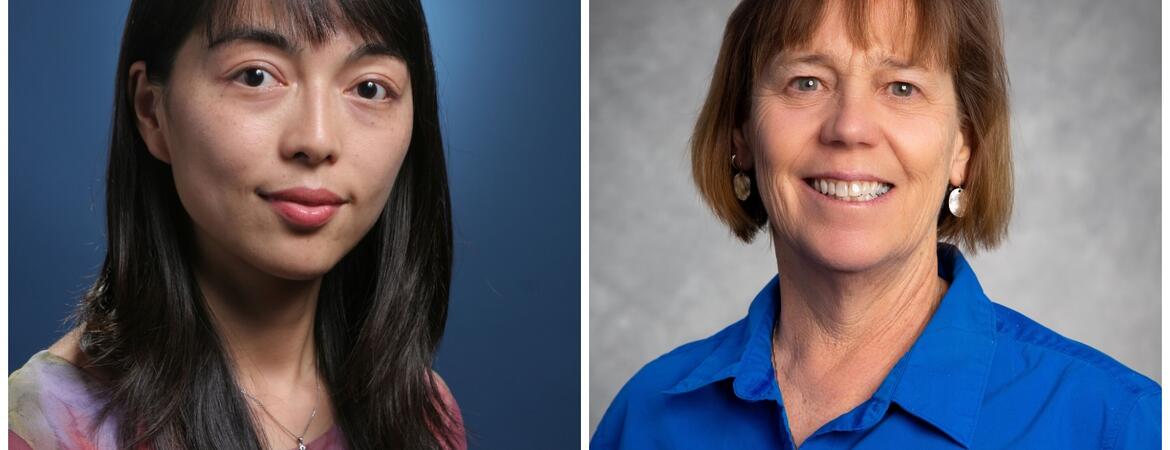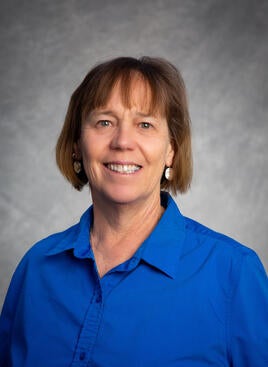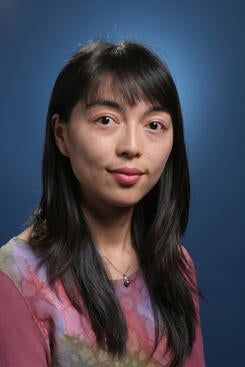
The National Academy of Sciences (NAS) is the highest-profile scientific organization in the country, and membership in it is a career-defining honor newly bestowed on two UC Riverside professors: Mary Droser, distinguished professor of earth and planetary sciences, and Hailing Jin, Cy Mouradick Endowed Chair of microbiology and plant pathology.
Though outstanding contributions to science are a prerequisite, membership in the academy is only possible by an election of peers.
Droser is a paleoecologist who studies the unfolding of complex life. For decades, she has been uncovering fossils in the Australian Outback. She and her students travel there frequently to discover strange, ancient animals previously unknown to science.
Typically, paleontologists collect fossils and bring them to a museum for further study. Instead, Droser and her collaborators excavate fossil beds in a unique area of the Outback that she was instrumental in helping establish as a national park. There she pieces the fossil beds together like puzzles and leaves them in the field, intact.
What emerges is a more complete picture of the creatures that emerged during the Ediacaran period, about 555 million years ago.
In 2022, Droser was the recipient of the prestigious NAS Charles Doolittle Walcott Medal. The medal, part of the academy’s Award in Early Earth and Life Sciences, is only given to one scientist in the world every eight years.
The secret to Droser’s professional accomplishments isn’t hidden in the remains of long-dead creatures. Instead, she credits much of her success to the living atmosphere on campus.
“The students and community at UCR, and their support, has made being a scientist here so rewarding and productive,” Droser said.
Jin is a professor of plant genetics whose work helps fight the never-ending battle to control agricultural pests and pathogens. She develops innovative and environmentally friendly crop protection strategies to safeguard global food security.
She holds multiple patents on technology for plant protection against fungal and bacterial pathogens, including a new generation of RNA-based fungicides and peptides that can control some bacterial species more effectively than antibiotics.
One of Jin’s ongoing projects has been to disrupt the advancement of gray mold, an aggressive fungus that infects more than 1,400 plant species ¾ nearly all fruits, vegetables, and many flowers. It causes billions in annual crop losses.
Her lab also identified a peptide found in Australian finger lime fruits that imparts resistance to citrus greening or Huanglongbing, a disease threatening citrus industries in the U.S. and worldwide. Currently, there is no commercially available cure for the disease, which has reduced citrus production in Florida by more than 75%.
In another major contribution to scientific research, Jin’s lab discovered cross-kingdom RNA communication, which revealed that small RNAs and mRNAs can move between species — such as from plants to pathogens — to regulate gene expression and cellular processes. This mechanism was later proven to be conserved across diverse interacting organisms, opening a new field of cross kingdom/cross species RNA communication. These findings have transformed our understanding of host–microbe interactions and offer innovative strategies for disease control in agriculture and beyond.
Earlier this year, Sue Wessler, distinguished UCR professor emerita of genetics, was elected to a four-year term as vice president of the NAS. In 2011, Wessler was elected NAS Home Secretary, and was the first woman to hold the position in the academy’s history. During her tenure she spearheaded efforts to increase diversity of the membership, and doubled the percentage of women in the academy to 22%.
NAS is dedicated to recognizing and advancing outstanding science and providing advice on the most pressing challenges facing the nation and the world. Part of its mission is to recognize and elevate outstanding science and foster its broad understanding.
The members elected in 2025 comprise 120 American and 30 international scientists who help fulfill this mission. Those elected this year bring the total number of active members to 2,662, and the total number of international members to 556.





